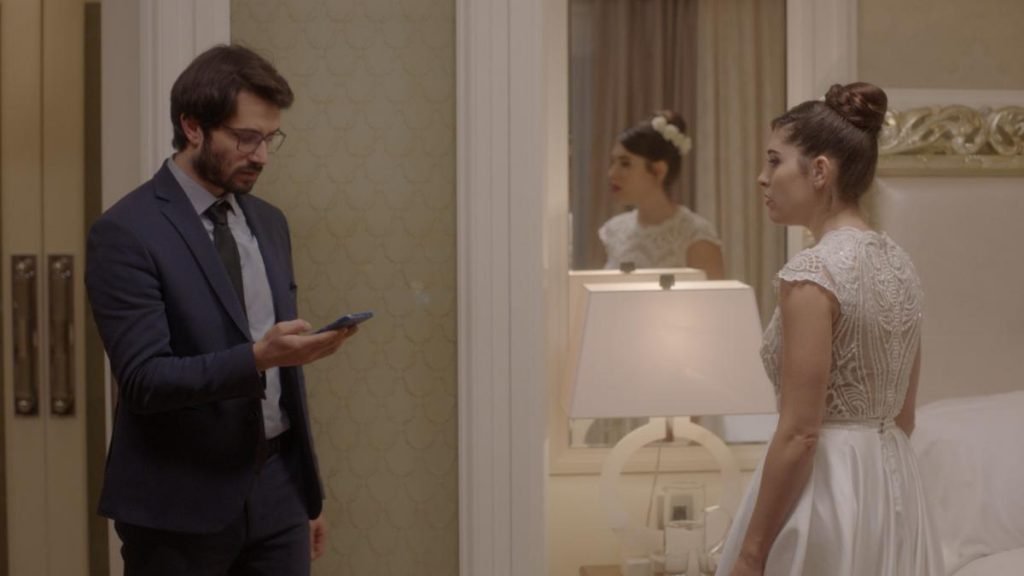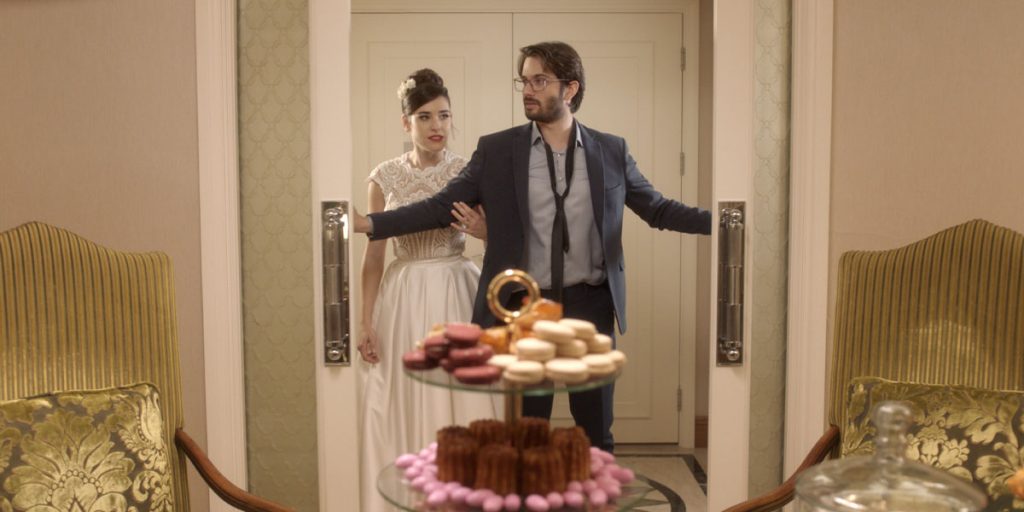Honeymood takes you through all those wedding-night emotions and then a bit more, a beautiful exposé of past loves, repressed doubts, and lives left behind.
A beautiful royal suite at the Waldorf Astoria, a newlywed couple still dazed from their party, what could possibly go wrong? Tayla Lavie’s Honeymood takes us through the early hours of night to the darkest relationship insecurities and identity crises. From petty fights to amorous ex-lovers, the bride and groom are in for the night of a lifetime. Honeymood shall be the sweetest and most comical Israeli film you’ll watch this year. Though the situations the newlyweds find themselves in might be a bit unbelievable, the realness of their emotions and thoughts turn this tragicomedy into a philosophical exploration on what is essentially good material for a happy marriage. Taking place in merely six hours, Noam (Ran Danker, Our Song, Doubtful) and Eleanor (Avigail Harari, Manpower, Out of Sight) feel like our own past, present and future relationships, or at least some of our more doubtful moments in them.
It is 1:30am, after a long day of wedding celebrations you expect the two lovebirds to do nothing else than enjoy their magnificent (and very expensive) royal suite that the groom’s father has rented for the occasion. They (or rather, she) revel in wedding night traditions, such as the carrying over the threshold of the bride, the attempt at seduction while being sewed in your wedding dress, or overindulging in the wine and chocolate while cheekily opening a few wedding gifts.
However, the trouble that will haunt the rest of their night is a secretly passed-over gift from the groom’s, Noam’s, ex-girlfriend, which Eleanor, the bride discovers on the elevator ride up to their suite. Being a bit jealous, possessive and over-dramatic (she is, after all, a drama teacher), Eleanor cannot, of course, let go of this pesty envelope (“and addressed only to you (Noam) even! Who does that at a wedding!”). She embarks on a possessive paranoic hunt to discover what is in the envelope, and of course how to return it, immediately.
Right off the bat, Noam and Eleanor look like the couple of dreams, she a big-smiled drama teacher with luscious brown hair and a bright red lip, he resembling that university teaching assistant with the sleepy eyes and nerdy glasses who magically shows up in her dreams one day, in everyone’s dreams. Though getting married might seem the most natural continuation of their relationship, if it is the right thing for them individually remains to be seen. Over the course of ninety minutes we learn that Noam hoped that getting married would bring peace and harmony to their life, whereas this is exactly what terrifies Eleanor. Honeymood is complete with a full set of ex-partners, students-who-are-not-friends, and overbearing groom’s parents, who, naturally, cannot stand the bride and much prefer the ex-girlfriend.

Where most romantic comedies would work through troubles and terrors end ultimately arrive at a happily-ever-after marriage (or at least the promise of one), Honeymood instead starts at the fairy-tale ending and wonders, what happens next? Talya Lavie (the director) was intrigued by the idea that a wedding is the ultimate happy ending, resolving all problems and curing all maladies, and Honeymood explores what will become of the infatuated lovers after their supposed happy ending. Even the cinematography reflects on its commitment to a particular genre, its blurry imagery and softened colours, as well as the wedding attire that Eleanor and Noam wear throughout the course of the film and night (albeit every scene worse for wear) stays true to the classic Hollywood romantic comedy. As the film goes on, the scenes become more and more surreal, while staying truer and truer to pure thoughts and emotions.
The imagery and metaphors interwoven in the narrative, as well as the cinematography, are beautifully done. The caged feeling of Eleanor now that she is married are reflected in her longing for the outdoors and her increased need of being loved and receiving attention. Noam on the other hand, seeks more the peace and calmness of indoor spaces, as well as longing to feel home with someone, whether that be an ex-girlfriend or a blond angelic nurse who turns out to be a mental patient. As the possibility of a romantic wedding night dissolves into the early hours of the night, Eleanor and Noam start to reflect on the terms of their marriage and the true meaning of their commitment to each other.
The despair and desperation between Noam wanting to have the wedding night he imagined, and Eleanor being set on fixing the one (of the many) thing(s) she obsesses over, are delivered in a way bordering on comical only to be lifted into wry and cynical narratives that raise Honeymood to the level of painfully accurate depictions of what it means to love and be in love. However, much they grow apart during the course of one night, or rather, realise how apart they are, in the end – how else could it be for a romantic comedy – they will always return to each other. It might take a few internal realisations and openly fought out shouting matches, but Honeymood tells us that the heart will want what it wants. It is okay to stray away some time and compromise, but in the end being together is always better than being alone.
Honeymood had its World Premiere at the BFI London Film Festival.

